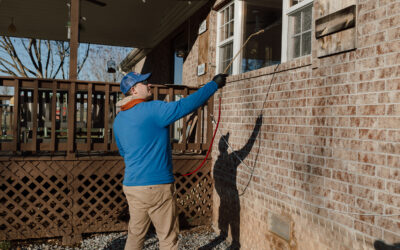
Why DIY pest control can be costly
DIY pest control can be a tempting option when you are worried about costs. However, with pest infestations, the situation can get out of control quickly, especially if you try to use pest control methods on your own that aren’t as effective as professional treatments would have been. You may end up wasting time and money on DIY methods while your pest problem grows worse.
Top ways that DIY pest control options can be costly:
It isn’t as effective.
Most DIY pest control methods are post-emergent, meaning they are meant to be applied after you notice the pest problem. For example, a DIY pest control solution for finding mouse droppings is to seal up holes in your home. While this is a proactive way for a homeowner or property manager to help control rodent problems, it doesn’t solve the problem of the rodents already living inside your home. Also, the average person may not be as well-equipped or experienced to even find all of the access points that a trained pest control specialist would know to look for and seal up.
It probably won’t last as long.
Some DIY pest control methods are appealing because they can seem more eco-friendly than professional treatments are often considered to be. For example, you can use peppermint oil around your living space and plant mint in your garden to deter rodents and other pests. However, most DIY pest control treatments simply don’t last as long as professional pest control programs. If you choose the DIY route, you’ll likely have to repeat treatments far more often than what a professional service provider would need to do to control pests for you.
It takes time to find solutions on your own.
Most of us don’t know that much about pest control or dealing with infestations of unwanted “guests.” In order to take on the task of DIY pest control, the average person will need to spend significant time researching solutions for their pest problems. Information found online usually needs to be fact checked, requiring you to review multiple sources to confirm that the method you are considering is safe to do on your own. Unfortunately, investing considerable time researching DIY pest control methods does not guarantee that they will work or that the information you found is appropriate for your climate, residential setting, your particular pest problems, or other variables.
You might make mistakes.
Even if you are willing to spend the time it will take to research and apply DIY pest control treatments, you might not have the experience that trained pest control professionals can offer. The level of experience gained by providing pest control services to countless homes and businesses is hard to beat. The average person likely hasn’t had this level of experience and might accidentally use too much of a potentially hazardous pest control product such as insecticide.
If you have decided DIY pest control isn’t for you, contact West Termite, Pest & Lawn today.
More posts from West Termite, Pest & Lawn
Pestproofing Entry Points Before Spring
As spring approaches in Arkansas, homeowners face an increased risk of pests seeking warmth, food, and shelter. Many infestations begin with small, unnoticed entry points that allow insects, rodents, and other pests to move indoors. Pestproofing your home before the...
Early Spring Termite Activity in Arkansas
As Arkansas begins to warm in early spring, homeowners may assume termites remain dormant until the summer months. In reality, spring termite colonies can become active much earlier, especially as soil temperatures rise and moisture levels increase. Subterranean and...
Preparing Your Home for Early Spring Pests
As winter fades and temperatures rise in Arkansas, homes become vulnerable to a fresh wave of early spring pests. Early spring is a critical time to take preventive action because insects, rodents, and other pests start emerging from dormancy, seeking food, warmth,...



